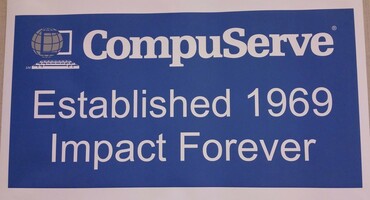When we were

"These people changed the world," said Jeff Wilkins, looking out across a Columbus, Ohio ballroom filled with more than 400 people. "And they know it, and are proud of it."
At one time, all this was his.
Wilkins was talking about...CompuServe, which he co-founded in 1969. How does it happen, he asked, that more than 400 people show up to celebrate a company that hasn't really existed for the last 23 years? I can't say, but a group of people happier to see each other (and random outsiders) again would be hard to find. "This is the only reunion I go to," one woman said.
It's easy to forget - or to never have known - CompuServe's former importance. Circa 1993, the Twitter handle now displayed on everyone's business cards and slides was their numbered CompuServe ID. My inclusion of mine (70007,5537) at the end of a Guardian article led a reader to complain that I should instead promote the small ISPs it would kill when broadband arrived. In 1994, Aerosmith released a single on CompuServe, the first time a major label tried online distribution. It probably took five hours to download.
In Wilkins' story, he was studying electrical engineering at the University of Arizona when his father-in-law asked for help with data processing for his new insurance company. Wilkins and fellow grad students Sandy Trevor, John Goltz, Larry Shelley, and Doug Chinnock, soon relocated to Columbus. It was, Wilkins said, Shelley who suggested starting a time-sharing company - "or should I say cloud computing?" Wilkins quipped, to applause and cheers.
Yes, he should. Everything new is old again.
In time-sharing, the fledgling company competed with GE and IBM. The information service started in 1979, as a way to occupy the computers during the empty evenings when the businesses had gone home. For the next 20 years, CompuServers invented everything for themselves: "GO" navigation commands, commercial email (first customer: HJ Heinz), live chat ("CB , news wires, online games and virtual worlds (partnering with Fujitsu on a graphical MUD), shopping... The now-ubiquitous GIF was the brainchild of Steve Wilhite (it's pronounced "JIF"). The legend of CompuServe inventions is kept alive by by Sandy Trevor and Dave Eastburn, whose Nuvocom "software archeology" business holds archives that have backed expert defense against numerous patent claims on technologies that CompuServe provably pioneered.
A panel reminisced about the CIS shopping mall. "We had an online stockbroker before anyone else thought about it," one said. Another remembered a call asking for a 30-minute meeting from the then-CEO of the nationwide flowers delivery service FTD. "I was too busy." (The CEO was Meg Whitman.). For CompuServe's 25th anniversary, the mall's travel agency collaborated on a three-day cruise with, as invited guests, the film critic Roger Ebert, who disseminated his movie reviews through the service and hosted the "Ask Roger Ebert" section in the Movies Forum, and his wife, Chaz. "That may have been the peak."
Mall stores paid an annual fee; curation ensured there weren't too many of any one category of store. Banners advertising products were such a novelty at the time - and often the liveliest, most visually attractive thing on the page - that as many as 25% of viewers clicked on them. Today, Amazon takes a percentage of transactions instead. "If we could have had a universal shopping cart, like Amazon," lamented one, "what might have been?"
Well, what? Could CompuServe now be under threat of a government-mandated breakup to separate its social media business, search, cloud provider, and shopping? Both CompuServe and AOL, whose speed to embrace graphical interfaces and aggressive marketing led it to first outstrip and then buy and dismantle CompuServe in the 1990s, would have had to cannibalize their existing businesses. Used to profits from access fees, both resisted the Internet's monthly subscription model.
One veteran openly admitted how profoundly he underestimated the threat of the Internet after surveying the rickety infrastructure designed by/for academics and students. "I didn't think that the Internet could survive in the reality of a business..." Instead, the information services saw their competition as each other. A contemporary view of the challenges is visible in this 1995 interview with Barry Berkov, the vice-president in charge of CIS.
However, CompuServe's closed approach left no opening for individuals' self-expression. The 1990s rising Internet stars, Geocities and MySpace, were all about that, as are today's social media.
So many shifts have changed social media since then: from topic-centered to person-centered forums, from proprietary to open to centralized, from dial-up modems to pervasive connections, the massive ramp-up of scale and, mobile-fueled, speed, along with the reconfiguration of business models and tehcnical infrastructure. Some things have degraded: past postings on Twitter and Facebook are much harder to find, and unwanted noise is everywhere. CompuServe would have had to navigate each of those shifts without error. As we know now, they didn't make it.
And yet, for 20-odd years, a company of early 20-somethings 2,500 miles from Silicon Valley, invented a prototype of today's world, at first unaware of the near-simultaneous first ARPAnet connection, the beginnings of the network they couldn't imagine would ever be trustworthy enough for businesses and governments to rely on. They may yet be proven right about that.
Illustrations: Jonathan Zittrain's mockup of the CompuServe welcome screen (left, with thanks) next to today's iPhone showing how little things have changed; the reunion banner.
Wendy M. Grossman is the 2013 winner of the Enigma Award. Her Web site has an extensive archive of her books, articles, and music, and an archive of earlier columns in this series. Stories about the border wars between cyberspace and real life are posted occasionally during the week at the net.wars Pinboard - or follow on Twitter.



